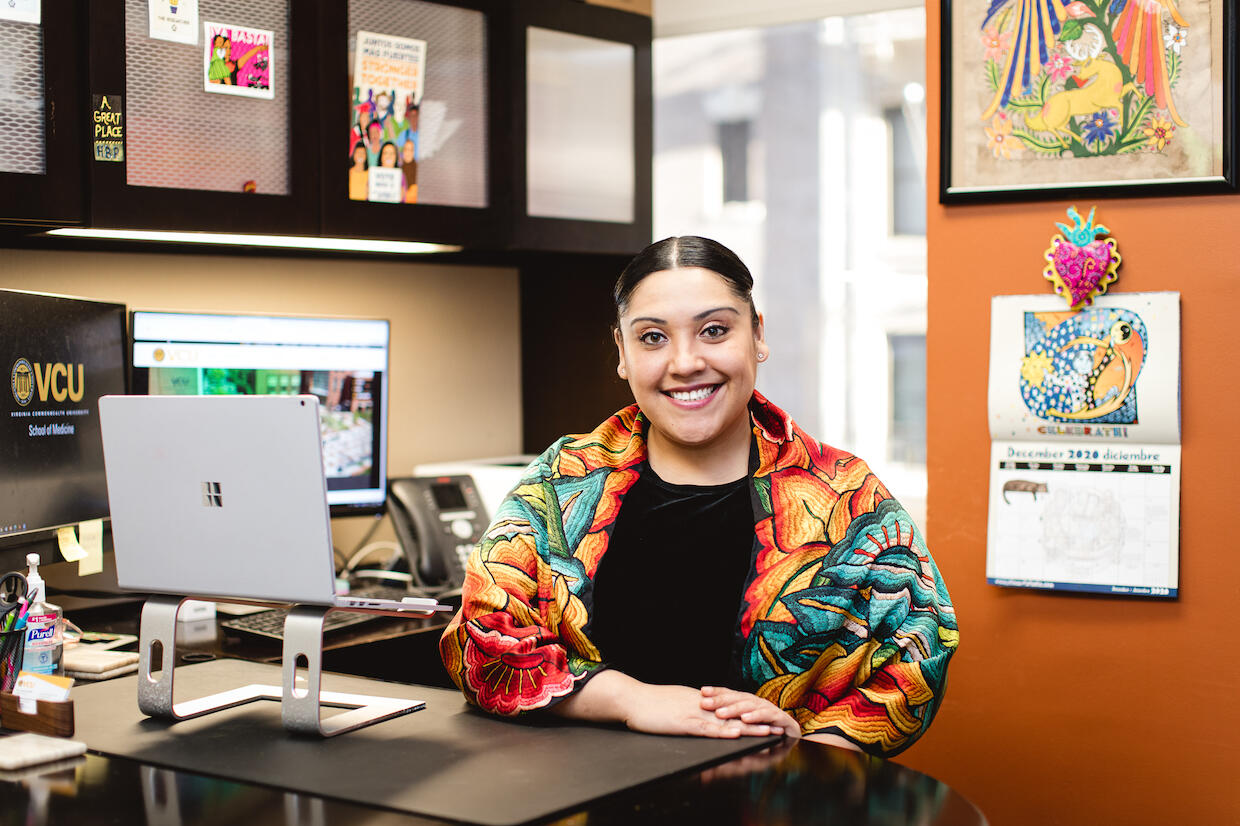
Feb. 25, 2021
VCU researcher is one of two nationwide to receive funding for review of medical education curricula
The goal is to use the findings to inform future diversity, equity and inclusion practices across medical schools, said Dina Garcia, an assistant professor in the School of Medicine.
Share this story
VCU School of Medicine’s Dina Garcia, Ph.D., is one of two researchers nationwide to receive funding in 2020 from the Society of Directors of Research in Medical Education for a review of anti-racist curricula in undergraduate and graduate medical education.
Garcia and a team of researchers from the Office of Assessment, Evaluation and Scholarship, the Department of Family Medicine and Population Health and VCU Libraries, will conduct the review.
“Health care professionals have a role in dismantling racism, and they have called for inclusion of health equity and inclusion in medical education. However, to date, that inclusion has not really happened to the degree of integration as it should,” said Garcia, an assistant professor in the Department of Health Behavior and Policy. “These scoping reviews are a way to galvanize efforts to ensure that curriculum is reflective of not just the needs of the field in general, but also for students who are undergoing training to see themselves reflected in curricula."
The aim, Garcia said, is to identify gaps and opportunities for growth along the medical education continuum and use the key findings to inform future diversity, equity and inclusion practices across medical schools.
“Many papers are published but not necessarily connected to other papers that are published, so they’re isolated in silos. This project is a scoping review, which will look at a group of papers about anti-racism together to track much more deeply what’s happening,” said Sally Santen, M.D., Ph.D., a professor in the Department of Emergency Medicine and director of the Office of Assessment, Evaluation and Scholarship. “For many people this is the foundation for deciding what the next research study should be.”
Santen also notes that the work of Garcia and her team is “a chance to highlight what’s happening at VCU.”
This past summer, the School of Medicine released a diversity, equity and inclusion statement expressing its commitment to fostering open dialogue with the community to inform meaningful actions, along with short- and long-term initiatives to address issues of racism and discrimination. The plan includes addressing racism and discrimination through new student orientation sessions called Critical Conversations; a medical education work group that is reviewing the curriculum through the lens of racism, bias, diversity, equity and inclusion; and a new faculty development program focusing on health equity and structural racism in health sciences curriculum.
The initiatives were, in part, a response to requests by students in the School of Medicine.
Second-year medical student Gerald Coronado, who serves as a representative on the School of Medicine’s recently convened Inclusion Council, said he appreciates the initial steps the administration has taken to address issues he’s observed in the curriculum. On tests, he said, stereotypes about minority groups are “often used as a box to steer you toward a specific answer,” such as Black patients being at risk for sickle cell anemia and gay patients having a higher risk of HIV. He also notes seeing a lack of diverse skin tones in lessons related to dermatology and hematology.
“It seems like a lot of the administration is open to listening,” Coronado said. “I know a lot of my classmates are just not sure if they’re open to changing the practices quite yet, but that’s what the Inclusion Council is for.”
Coronado recognizes that change won’t happen overnight, and he aims to serve as a liaison between his peers and School of Medicine leadership. He’s also optimistic that the incremental changes happening now will set a new standard for future School of Medicine classes.
“Some students have already made comments about how they appreciated some of the steps, like the LGBTQ discussions in orientation and discussing the history of VCU’s racist actions in the past,” said Coronado, referring to the Critical Conversations sessions. “Some have said they ... wish [these sessions] could have gone further, but my class didn’t really even have that. And because they’ve already started it, that will be the new expectation.”
Garcia said she applauds the medical students for approaching the School of Medicine with a call to action.
“Oftentimes in academia we can get caught up in top-down approaches in terms of how things should be done, and this is a prime example of the need for collaboration,” she said. “With that in mind, I do think the School of Medicine is moving toward implementing approaches within the institution that will be more responsive to the needs of students and community members.”
Community engagement is critical in diversity, equity and inclusion efforts, Garcia said, and it will be a major component of her team’s scoping review. Once the researchers have reviewed and synthesized the relevant literature to answer the focal question, they will conduct focus groups with key stakeholders from medical institutions across the U.S. to validate their findings. They are planning to begin these sessions by early next year and will use the findings to inform diversity, equity and inclusion practices at medical schools nationwide, including the VCU School of Medicine.
"Research can’t just be through the lens of the researcher. It has to include the voices of those affected as well,” Garcia said. “We look forward to widely disseminating our findings and collectively working with our colleagues to further strengthen how we train medical students."
Subscribe to VCU News
Subscribe to VCU News at newsletter.vcu.edu and receive a selection of stories, videos, photos, news clips and event listings in your inbox.









